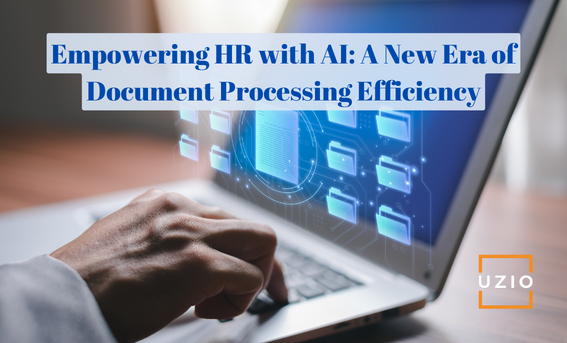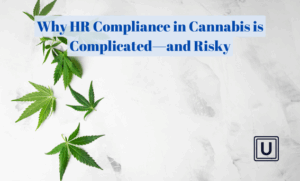
Transforming HR Efficiency: The Power of AI in Document Processing
Quick links
-
Introduction
-
The Era of Manual HR Document Management
-
The Advent of AI in HR Document Processing
-
Benefits Beyond Efficiency
-
Overcoming Challenges and Limitations
-
The Future of AI in HR Document Management
1. Introduction
In the realm of Human Resources, managing documents has traditionally been fraught with inefficiencies and errors. HR departments have long been overwhelmed by manual tasks, from data entry to benefits paperwork. Enter Artificial Intelligence (AI), a revolutionary force poised to redefine HR document processing. With tools like UZIO AI Copilot, AI technology automates data extraction and processing, marking a pivotal moment in the evolution of HR efficiency.
2. The Era of Manual HR Document Management
In the not-so-distant past, the management of HR documents was an entirely manual affair, characterized by towering stacks of paper, rows of filing cabinets, and the constant click-clack of keyboards as HR professionals diligently entered data into spreadsheets or localized systems. This conventional approach to document management was not just a physical burden but a procedural one, demanding meticulous attention to detail and an inordinate amount of time.
Manual Processes and Their Drawbacks
- Data Entry and Updates: Manual entry of new hires, policy updates, or benefits changes is time-consuming and prone to errors.
- Document Filing and Retrieval: Physical documents require significant space and time to file and retrieve.
- Compliance and Reporting: Manual updates and reporting are fraught with the potential for oversight and error.
- Employee Queries: Manually searching documents to respond to employee inquiries adds to the HR workload.
Challenges Faced by HR Departments
- Time Consumption: The sheer volume of manual tasks consumed hours that could otherwise be spent on strategic HR initiatives, such as talent development or workplace culture enhancement.
- High Error Rates: Manual data entry and document management are inherently prone to human error. Even minor mistakes could lead to significant issues, from incorrect payroll processing to compliance violations.
- Inefficiencies: The manual handling of HR documents led to operational inefficiencies, with a considerable portion of HR resources dedicated to administrative tasks rather than strategic value-add activities.
- Limited Accessibility and Scalability: Physical document storage not only limited access to information (often confined to office hours) but also posed challenges in scaling HR operations to match organizational growth.
This era of manual HR document management, while foundational, highlighted the critical need for innovation and transformation. The limitations and challenges inherent in these traditional processes set the stage for the introduction of AI technologies, promising a new direction towards efficiency, accuracy, and strategic HR management.
3. The Advent of AI in HR Document Processing
AI technologies like natural language processing (NLP), machine learning (ML), and optical character recognition (OCR) have begun to transform HR document management. UZIO AI Copilot, at the forefront of this revolution, automates the HR document processing workflow, dramatically speeding up tasks and improving accuracy.
Key Features of AI-Driven Document Processing
The integration of Artificial Intelligence (AI) into HR document processing has introduced a suite of features that significantly enhance the efficiency and accuracy of HR operations. Among these, three key features stand out: Automated Data Extraction, Error Reduction, and Time Savings. Each of these features contributes to transforming the HR landscape, making processes more streamlined and reliable.
Automated Data Extraction
- How It Works: AI-driven document processing utilizes technologies like Optical Character Recognition (OCR) and Natural Language Processing (NLP) to scan, read, and understand the content of various HR documents. Whether it’s PDFs, scanned images, or digital forms, AI identifies and extracts key information such as employee details, plan benefits, and compliance requirements.
- Benefits: This automation eliminates the need for HR staff to manually input data from documents into HR systems. By directly extracting information like names, dates, and numerical data, AI ensures that essential data is captured accurately and efficiently, ready for further processing or analysis.
Error Reduction
- Impact of AI: One of the most significant advantages of AI in document processing is its ability to reduce errors associated with manual data entry. AI systems are designed to recognize patterns and learn from them, which means they can identify discrepancies or anomalies that might indicate a mistake. For instance, if an extracted date doesn’t follow a logical sequence (e.g., a termination date before a start date), the system can flag this for review.
- Improving Data Accuracy: By minimizing manual entry errors, AI not only ensures the integrity of HR data but also supports better decision-making based on accurate information. This level of precision is crucial for tasks like payroll processing, benefits administration, and compliance reporting, where errors can have significant repercussions.
Time Savings
- Efficiency Gains: The automation of data extraction and the reduction of errors lead to substantial time savings for HR departments. What once took hours of manual labor — sifting through documents, typing data into systems, and double-checking for mistakes — can now be accomplished in a fraction of the time.
- Reallocating Resources: These time savings allow HR professionals to redirect their focus from administrative tasks to more strategic initiatives. Whether it’s enhancing employee engagement, developing training programs, or analyzing workforce trends, AI frees up valuable resources to concentrate on areas that contribute to organizational growth and employee well-being.
Together, these key features of AI-driven document processing mark a significant advancement in the field of HR technology. By leveraging the capabilities of UZIO AI Copilot, organizations can not only streamline their HR document management processes but also elevate the role of HR within the company, shifting from administrative gatekeepers to strategic partners in business success.
4. Benefits Beyond Efficiency
The adoption of AI-driven document processing, exemplified by tools like UZIO AI Copilot, extends benefits far beyond mere operational efficiency. These technologies are reshaping the HR landscape in profound ways, enhancing employee satisfaction, enabling a strategic HR focus, and supporting scalability.
Employee Satisfaction
- Faster, more accurate document processing improves the employee experience, fostering a positive workplace environment.
Strategic HR Focus
- AI automation allows HR professionals to shift their focus to strategic initiatives, enhancing the department’s value.
Scalability
- AI document processing technologies support organizational growth, handling increasing volumes of data without a proportional increase in errors.
5. Overcoming Challenges and Limitations
While AI in HR document processing offers numerous advantages, it also presents challenges and limitations that organizations must navigate carefully.
Addressing Common Concerns
- Data Security: The use of AI in handling sensitive HR documents raises valid concerns about data security and privacy. Ensuring that AI systems are designed with robust security measures and comply with data protection regulations is paramount.
- Human Oversight: Despite the sophistication of AI technologies, human oversight remains crucial. HR professionals should review AI-processed data for accuracy and intervene in complex cases that require human judgment.
6. The Future of AI in HR Document Management
AI’s role in HR is set to expand, with future systems offering enhanced natural language processing, predictive analytics, and integration with emerging technologies. These advancements promise to automate compliance monitoring, personalize employee experiences, and provide enhanced decision support.
AI technologies like UZIO AI Copilot are transforming HR document management, automating tedious tasks, and enabling HR departments to focus on strategic initiatives. As AI continues to evolve, its potential to revolutionize HR practices grows, making the adoption of AI technologies a necessity for modern HR departments.
Get in touch with us for an expert-led demo to know more about UZIO all-in-one payroll software.





